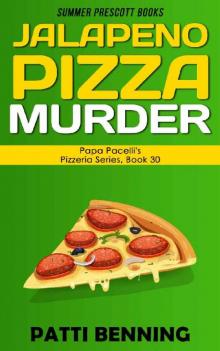 Jalapeno Pizza Murder
Jalapeno Pizza Murder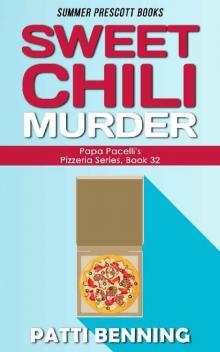 Sweet Chili Murder
Sweet Chili Murder Pork, Pizza and Murder
Pork, Pizza and Murder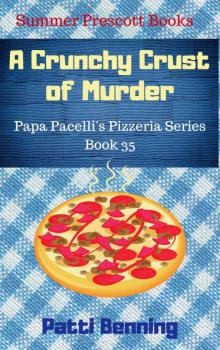 A Crunchy Crust of Murder
A Crunchy Crust of Murder Dying to Cook
Dying to Cook A Saucy Taste of Murder
A Saucy Taste of Murder Dating Is Murder
Dating Is Murder Pesto Pizza Murder
Pesto Pizza Murder Boldly Basil Murder
Boldly Basil Murder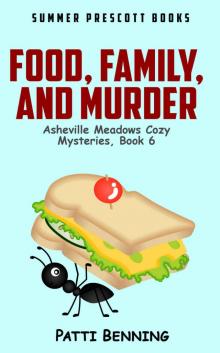 Food, Family, and Murder
Food, Family, and Murder Fish, Chips, and Murder
Fish, Chips, and Murder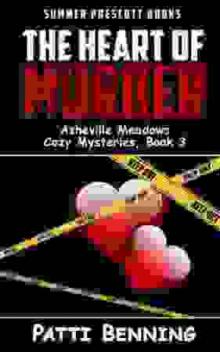 The Heart of Murder
The Heart of Murder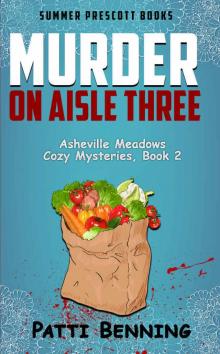 Murder on Aisle Three
Murder on Aisle Three Rock Candy and Robberies
Rock Candy and Robberies Murder, My Darling
Murder, My Darling Peppermint Fudge and Fears
Peppermint Fudge and Fears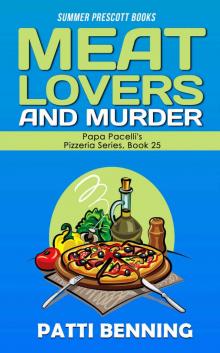 Meat Lovers and Murder
Meat Lovers and Murder Shrimply Sublime Murder
Shrimply Sublime Murder Wedding Woes
Wedding Woes Hot, Spicy Murder
Hot, Spicy Murder Vicious Valentine
Vicious Valentine A Side of Murder: Book 18 in The Darling Deli Series
A Side of Murder: Book 18 in The Darling Deli Series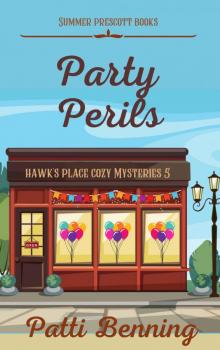 Party Perils
Party Perils Parmesan Pizza Murder
Parmesan Pizza Murder Thanksgiving Deli Murder (The Darling Deli Series Book 28)
Thanksgiving Deli Murder (The Darling Deli Series Book 28) Sugar Coated Murder
Sugar Coated Murder Breakfast Pizza Murder (Papa Pacelli's Pizzeria Series Book 17)
Breakfast Pizza Murder (Papa Pacelli's Pizzeria Series Book 17)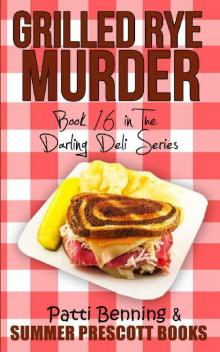 Grilled Rye Murder: Book 16 in The Darling Deli Series
Grilled Rye Murder: Book 16 in The Darling Deli Series Hearty Homestyle Murder: Book 9 in The Darling Deli Series
Hearty Homestyle Murder: Book 9 in The Darling Deli Series Spooky Pizza Murder
Spooky Pizza Murder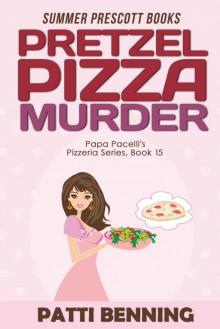 Pretzel Pizza Murder
Pretzel Pizza Murder Gazpacho Murder
Gazpacho Murder Murder Befalls Us
Murder Befalls Us Mountains, Marriage and Murder (The Darling Deli Series Book 23)
Mountains, Marriage and Murder (The Darling Deli Series Book 23) Pall Bearers and Pepperoni: Book 1 in The Papa Pacelli's Pizzeria Series
Pall Bearers and Pepperoni: Book 1 in The Papa Pacelli's Pizzeria Series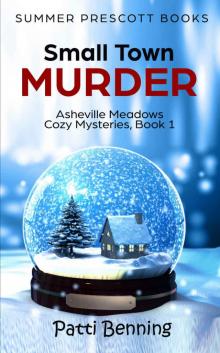 Small Town Murder (Asheville Meadows Cozy Mysteries Book 1)
Small Town Murder (Asheville Meadows Cozy Mysteries Book 1)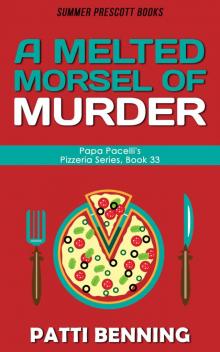 A Melted Morsel of Murder
A Melted Morsel of Murder A Merry Little Murder
A Merry Little Murder Pies, Lies and Murder
Pies, Lies and Murder Chicken Club Murder (The Darling Deli Series Book 21)
Chicken Club Murder (The Darling Deli Series Book 21) Shamrocks and Murder
Shamrocks and Murder Garden Vegetable Murder: Book 12 of The Darling Deli Series
Garden Vegetable Murder: Book 12 of The Darling Deli Series Gazpacho Murder (The Darling Deli Series Book 25)
Gazpacho Murder (The Darling Deli Series Book 25) Crunchy Christmas Murder: Killer Cookie Cozy Mysteries, Book 4
Crunchy Christmas Murder: Killer Cookie Cozy Mysteries, Book 4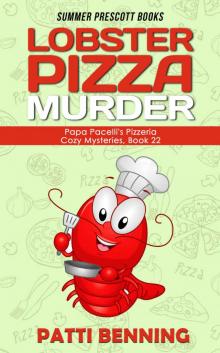 Lobster Pizza Murder (Papa Pacelli's Pizzeria Series Book 22)
Lobster Pizza Murder (Papa Pacelli's Pizzeria Series Book 22)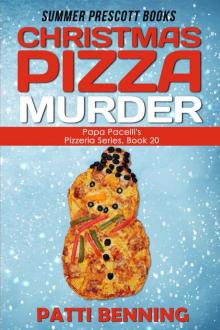 CHRISTMAS PIZZA MURDER
CHRISTMAS PIZZA MURDER Killer Halloween Cookies: Book 2 in The Killer Cookie Cozy Mysteries
Killer Halloween Cookies: Book 2 in The Killer Cookie Cozy Mysteries Mozzarella and Murder (Papa Pacelli's Pizzeria Series Book 13)
Mozzarella and Murder (Papa Pacelli's Pizzeria Series Book 13) VALENTINES AND MURDER
VALENTINES AND MURDER Mystical Murder: A Whiskers and Witches Cozy Mystery, Book 1 (Whiskers and Witches Cozy Mysteries)
Mystical Murder: A Whiskers and Witches Cozy Mystery, Book 1 (Whiskers and Witches Cozy Mysteries) Four Cheese Murder: Book Seven in Papa Pacelli's Pizzeria Series
Four Cheese Murder: Book Seven in Papa Pacelli's Pizzeria Series On the Wings of Murder
On the Wings of Murder Exotic Pizza Murder (Papa Pacelli's Pizzeria Series Book 9)
Exotic Pizza Murder (Papa Pacelli's Pizzeria Series Book 9) Mountains, Marriage and Murder
Mountains, Marriage and Murder Tomato Basil Murder: Book 7 in The Darling Deli Series
Tomato Basil Murder: Book 7 in The Darling Deli Series Peppered With Murder
Peppered With Murder Pastrami Murder: Book One in The Darling Deli Series
Pastrami Murder: Book One in The Darling Deli Series A CRISPY SLICE OF MURDER (Papa Pacelli's Pizzeria Series Book 21)
A CRISPY SLICE OF MURDER (Papa Pacelli's Pizzeria Series Book 21) Ravioli Soup Murder
Ravioli Soup Murder Chicken Pesto Murder: Book 5 in The Darling Deli Series
Chicken Pesto Murder: Book 5 in The Darling Deli Series Breakfast Pizza Murder
Breakfast Pizza Murder Peppered With Murder (The Darling Deli Series Book 26)
Peppered With Murder (The Darling Deli Series Book 26) Ravioli Soup Murder (The Darling Deli Series Book 27)
Ravioli Soup Murder (The Darling Deli Series Book 27) Spicy Lasagna Murder: Book 13 in The Darling Deli Series
Spicy Lasagna Murder: Book 13 in The Darling Deli Series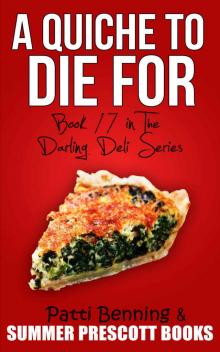 A Quiche To Die For: Book 17 in The Darling Deli Series
A Quiche To Die For: Book 17 in The Darling Deli Series Wrapped in Murder (The Darling Deli Series Book 19)
Wrapped in Murder (The Darling Deli Series Book 19) Italian Wedding Murder: Book 4 in Papa Pacelli's Pizzeria Series
Italian Wedding Murder: Book 4 in Papa Pacelli's Pizzeria Series VALENTINES AND MURDER (The Darling Deli Series Book 30)
VALENTINES AND MURDER (The Darling Deli Series Book 30) Cold Cut Murder: Book Three in The Darling Deli Series
Cold Cut Murder: Book Three in The Darling Deli Series A SEASON OF MURDER
A SEASON OF MURDER On the Wings of Murder (Papa Pacelli's Pizzeria Series Book 12)
On the Wings of Murder (Papa Pacelli's Pizzeria Series Book 12) Creamy Casserole Murder: Book 15 in The Darling Deli Series
Creamy Casserole Murder: Book 15 in The Darling Deli Series Salami Murder: Book 8 in The Darling Deli Series
Salami Murder: Book 8 in The Darling Deli Series Mozzarella and Murder
Mozzarella and Murder Halloween Pizza Murder (Papa Pacelli's Pizzeria Series Book 18)
Halloween Pizza Murder (Papa Pacelli's Pizzeria Series Book 18)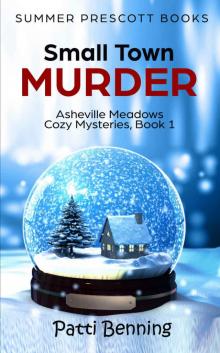 Small Town Murder
Small Town Murder A SEASON OF MURDER (The Darling Deli Series Book 29)
A SEASON OF MURDER (The Darling Deli Series Book 29)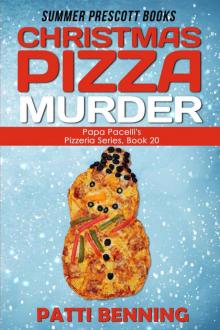 Christmas Pizza Murder (Papa Pacelli's Pizzeria Series Book 20)
Christmas Pizza Murder (Papa Pacelli's Pizzeria Series Book 20) Shrimply Murder
Shrimply Murder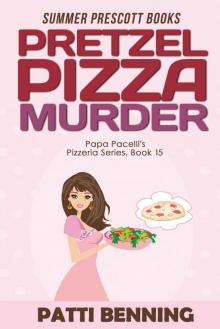 Pretzel Pizza Murder (Papa Pacelli's Pizzeria Series Book 15)
Pretzel Pizza Murder (Papa Pacelli's Pizzeria Series Book 15) Grilled Cheese Murder: Book 4 in The Darling Deli Series
Grilled Cheese Murder: Book 4 in The Darling Deli Series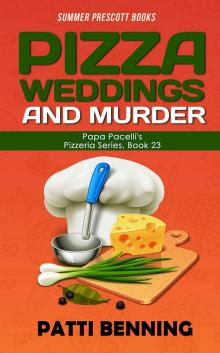 Pizza, Weddings, and Murder (Papa Pacelli's Pizzeria Series Book 23)
Pizza, Weddings, and Murder (Papa Pacelli's Pizzeria Series Book 23) Killer Caramel Cookies: Book 1 in the Killer Cookie Series
Killer Caramel Cookies: Book 1 in the Killer Cookie Series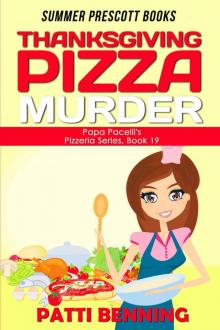 Thanksgiving Pizza Murder
Thanksgiving Pizza Murder Very Veggie Murder: Book 3 in Papa Pacelli's Pizzeria Series
Very Veggie Murder: Book 3 in Papa Pacelli's Pizzeria Series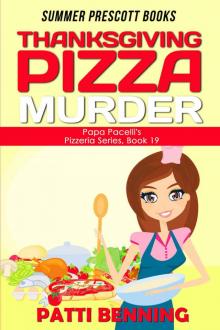 Thanksgiving Pizza Murder (Papa Pacelli's Pizzeria Series Book 19)
Thanksgiving Pizza Murder (Papa Pacelli's Pizzeria Series Book 19) Parmesan Pizza Murder (Papa Pacelli's Pizzeria Series Book 16)
Parmesan Pizza Murder (Papa Pacelli's Pizzeria Series Book 16)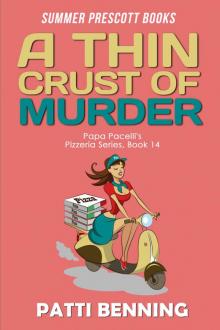 A Thin Crust of Murder
A Thin Crust of Murder Halloween Pizza Murder
Halloween Pizza Murder Pies, Lies and Murder (The Darling Deli Series Book 22)
Pies, Lies and Murder (The Darling Deli Series Book 22)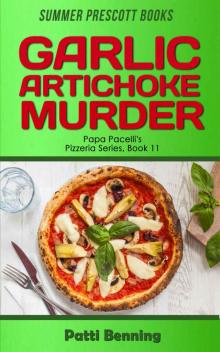 Garlic Artichoke Murder (Papa Pacelli's Pizzeria Series Book 11)
Garlic Artichoke Murder (Papa Pacelli's Pizzeria Series Book 11) Honey BBQ Murder: Book 10 in the Darling Deli Series
Honey BBQ Murder: Book 10 in the Darling Deli Series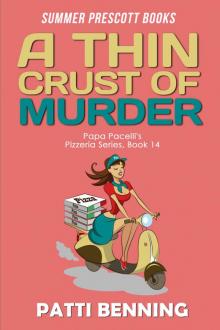 A Thin Crust of Murder (Papa Pacelli's Pizzeria Series Book 14)
A Thin Crust of Murder (Papa Pacelli's Pizzeria Series Book 14) Beef Brisket Murder: Book 11 in The Darling Deli Series
Beef Brisket Murder: Book 11 in The Darling Deli Series Glazed Ham Murder (The Darling Deli Series Book 20)
Glazed Ham Murder (The Darling Deli Series Book 20) Pizza, Paradise, and Murder (Papa Pacelli's Pizzeria Series Book 24)
Pizza, Paradise, and Murder (Papa Pacelli's Pizzeria Series Book 24) Smoked Gouda Murder: Book 5 in Papa Pacelli's Pizzeria Series
Smoked Gouda Murder: Book 5 in Papa Pacelli's Pizzeria Series Thanksgiving Deli Murder
Thanksgiving Deli Murder Curried Lobster Murder: Book 14 in The Darling Deli Series
Curried Lobster Murder: Book 14 in The Darling Deli Series Jalapeno Pizza Murder
Jalapeno Pizza Murder Sweet Chili Murder
Sweet Chili Murder Pork, Pizza and Murder
Pork, Pizza and Murder A Crunchy Crust of Murder
A Crunchy Crust of Murder Dying to Cook
Dying to Cook A Saucy Taste of Murder
A Saucy Taste of Murder Dating Is Murder
Dating Is Murder Pesto Pizza Murder
Pesto Pizza Murder Boldly Basil Murder
Boldly Basil Murder Food, Family, and Murder
Food, Family, and Murder Fish, Chips, and Murder
Fish, Chips, and Murder The Heart of Murder
The Heart of Murder Murder on Aisle Three
Murder on Aisle Three Rock Candy and Robberies
Rock Candy and Robberies Murder, My Darling
Murder, My Darling Peppermint Fudge and Fears
Peppermint Fudge and Fears Meat Lovers and Murder
Meat Lovers and Murder Shrimply Sublime Murder
Shrimply Sublime Murder Wedding Woes
Wedding Woes Hot, Spicy Murder
Hot, Spicy Murder Vicious Valentine
Vicious Valentine A Side of Murder: Book 18 in The Darling Deli Series
A Side of Murder: Book 18 in The Darling Deli Series Party Perils
Party Perils Parmesan Pizza Murder
Parmesan Pizza Murder Thanksgiving Deli Murder (The Darling Deli Series Book 28)
Thanksgiving Deli Murder (The Darling Deli Series Book 28) Sugar Coated Murder
Sugar Coated Murder Breakfast Pizza Murder (Papa Pacelli's Pizzeria Series Book 17)
Breakfast Pizza Murder (Papa Pacelli's Pizzeria Series Book 17) Grilled Rye Murder: Book 16 in The Darling Deli Series
Grilled Rye Murder: Book 16 in The Darling Deli Series Hearty Homestyle Murder: Book 9 in The Darling Deli Series
Hearty Homestyle Murder: Book 9 in The Darling Deli Series Spooky Pizza Murder
Spooky Pizza Murder Pretzel Pizza Murder
Pretzel Pizza Murder Gazpacho Murder
Gazpacho Murder Murder Befalls Us
Murder Befalls Us Mountains, Marriage and Murder (The Darling Deli Series Book 23)
Mountains, Marriage and Murder (The Darling Deli Series Book 23) Pall Bearers and Pepperoni: Book 1 in The Papa Pacelli's Pizzeria Series
Pall Bearers and Pepperoni: Book 1 in The Papa Pacelli's Pizzeria Series Small Town Murder (Asheville Meadows Cozy Mysteries Book 1)
Small Town Murder (Asheville Meadows Cozy Mysteries Book 1) A Melted Morsel of Murder
A Melted Morsel of Murder A Merry Little Murder
A Merry Little Murder Pies, Lies and Murder
Pies, Lies and Murder Chicken Club Murder (The Darling Deli Series Book 21)
Chicken Club Murder (The Darling Deli Series Book 21) Shamrocks and Murder
Shamrocks and Murder Garden Vegetable Murder: Book 12 of The Darling Deli Series
Garden Vegetable Murder: Book 12 of The Darling Deli Series Gazpacho Murder (The Darling Deli Series Book 25)
Gazpacho Murder (The Darling Deli Series Book 25) Crunchy Christmas Murder: Killer Cookie Cozy Mysteries, Book 4
Crunchy Christmas Murder: Killer Cookie Cozy Mysteries, Book 4 Lobster Pizza Murder (Papa Pacelli's Pizzeria Series Book 22)
Lobster Pizza Murder (Papa Pacelli's Pizzeria Series Book 22) CHRISTMAS PIZZA MURDER
CHRISTMAS PIZZA MURDER Killer Halloween Cookies: Book 2 in The Killer Cookie Cozy Mysteries
Killer Halloween Cookies: Book 2 in The Killer Cookie Cozy Mysteries Mozzarella and Murder (Papa Pacelli's Pizzeria Series Book 13)
Mozzarella and Murder (Papa Pacelli's Pizzeria Series Book 13) VALENTINES AND MURDER
VALENTINES AND MURDER Mystical Murder: A Whiskers and Witches Cozy Mystery, Book 1 (Whiskers and Witches Cozy Mysteries)
Mystical Murder: A Whiskers and Witches Cozy Mystery, Book 1 (Whiskers and Witches Cozy Mysteries) Four Cheese Murder: Book Seven in Papa Pacelli's Pizzeria Series
Four Cheese Murder: Book Seven in Papa Pacelli's Pizzeria Series On the Wings of Murder
On the Wings of Murder Exotic Pizza Murder (Papa Pacelli's Pizzeria Series Book 9)
Exotic Pizza Murder (Papa Pacelli's Pizzeria Series Book 9) Mountains, Marriage and Murder
Mountains, Marriage and Murder Tomato Basil Murder: Book 7 in The Darling Deli Series
Tomato Basil Murder: Book 7 in The Darling Deli Series Peppered With Murder
Peppered With Murder Pastrami Murder: Book One in The Darling Deli Series
Pastrami Murder: Book One in The Darling Deli Series A CRISPY SLICE OF MURDER (Papa Pacelli's Pizzeria Series Book 21)
A CRISPY SLICE OF MURDER (Papa Pacelli's Pizzeria Series Book 21) Ravioli Soup Murder
Ravioli Soup Murder Chicken Pesto Murder: Book 5 in The Darling Deli Series
Chicken Pesto Murder: Book 5 in The Darling Deli Series Breakfast Pizza Murder
Breakfast Pizza Murder Peppered With Murder (The Darling Deli Series Book 26)
Peppered With Murder (The Darling Deli Series Book 26) Ravioli Soup Murder (The Darling Deli Series Book 27)
Ravioli Soup Murder (The Darling Deli Series Book 27) Spicy Lasagna Murder: Book 13 in The Darling Deli Series
Spicy Lasagna Murder: Book 13 in The Darling Deli Series A Quiche To Die For: Book 17 in The Darling Deli Series
A Quiche To Die For: Book 17 in The Darling Deli Series Wrapped in Murder (The Darling Deli Series Book 19)
Wrapped in Murder (The Darling Deli Series Book 19) Italian Wedding Murder: Book 4 in Papa Pacelli's Pizzeria Series
Italian Wedding Murder: Book 4 in Papa Pacelli's Pizzeria Series VALENTINES AND MURDER (The Darling Deli Series Book 30)
VALENTINES AND MURDER (The Darling Deli Series Book 30) Cold Cut Murder: Book Three in The Darling Deli Series
Cold Cut Murder: Book Three in The Darling Deli Series A SEASON OF MURDER
A SEASON OF MURDER On the Wings of Murder (Papa Pacelli's Pizzeria Series Book 12)
On the Wings of Murder (Papa Pacelli's Pizzeria Series Book 12) Creamy Casserole Murder: Book 15 in The Darling Deli Series
Creamy Casserole Murder: Book 15 in The Darling Deli Series Salami Murder: Book 8 in The Darling Deli Series
Salami Murder: Book 8 in The Darling Deli Series Mozzarella and Murder
Mozzarella and Murder Halloween Pizza Murder (Papa Pacelli's Pizzeria Series Book 18)
Halloween Pizza Murder (Papa Pacelli's Pizzeria Series Book 18) Small Town Murder
Small Town Murder A SEASON OF MURDER (The Darling Deli Series Book 29)
A SEASON OF MURDER (The Darling Deli Series Book 29) Christmas Pizza Murder (Papa Pacelli's Pizzeria Series Book 20)
Christmas Pizza Murder (Papa Pacelli's Pizzeria Series Book 20) Shrimply Murder
Shrimply Murder Pretzel Pizza Murder (Papa Pacelli's Pizzeria Series Book 15)
Pretzel Pizza Murder (Papa Pacelli's Pizzeria Series Book 15) Grilled Cheese Murder: Book 4 in The Darling Deli Series
Grilled Cheese Murder: Book 4 in The Darling Deli Series Pizza, Weddings, and Murder (Papa Pacelli's Pizzeria Series Book 23)
Pizza, Weddings, and Murder (Papa Pacelli's Pizzeria Series Book 23) Killer Caramel Cookies: Book 1 in the Killer Cookie Series
Killer Caramel Cookies: Book 1 in the Killer Cookie Series Thanksgiving Pizza Murder
Thanksgiving Pizza Murder Very Veggie Murder: Book 3 in Papa Pacelli's Pizzeria Series
Very Veggie Murder: Book 3 in Papa Pacelli's Pizzeria Series Thanksgiving Pizza Murder (Papa Pacelli's Pizzeria Series Book 19)
Thanksgiving Pizza Murder (Papa Pacelli's Pizzeria Series Book 19) Parmesan Pizza Murder (Papa Pacelli's Pizzeria Series Book 16)
Parmesan Pizza Murder (Papa Pacelli's Pizzeria Series Book 16) A Thin Crust of Murder
A Thin Crust of Murder Halloween Pizza Murder
Halloween Pizza Murder Pies, Lies and Murder (The Darling Deli Series Book 22)
Pies, Lies and Murder (The Darling Deli Series Book 22) Garlic Artichoke Murder (Papa Pacelli's Pizzeria Series Book 11)
Garlic Artichoke Murder (Papa Pacelli's Pizzeria Series Book 11) Honey BBQ Murder: Book 10 in the Darling Deli Series
Honey BBQ Murder: Book 10 in the Darling Deli Series A Thin Crust of Murder (Papa Pacelli's Pizzeria Series Book 14)
A Thin Crust of Murder (Papa Pacelli's Pizzeria Series Book 14) Beef Brisket Murder: Book 11 in The Darling Deli Series
Beef Brisket Murder: Book 11 in The Darling Deli Series Glazed Ham Murder (The Darling Deli Series Book 20)
Glazed Ham Murder (The Darling Deli Series Book 20) Pizza, Paradise, and Murder (Papa Pacelli's Pizzeria Series Book 24)
Pizza, Paradise, and Murder (Papa Pacelli's Pizzeria Series Book 24) Smoked Gouda Murder: Book 5 in Papa Pacelli's Pizzeria Series
Smoked Gouda Murder: Book 5 in Papa Pacelli's Pizzeria Series Thanksgiving Deli Murder
Thanksgiving Deli Murder Curried Lobster Murder: Book 14 in The Darling Deli Series
Curried Lobster Murder: Book 14 in The Darling Deli Series